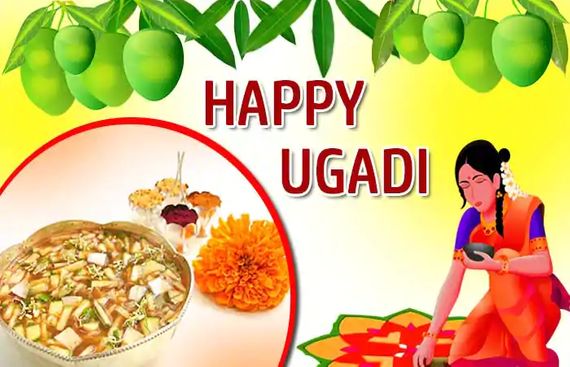Ugadi: One Festival, Many Faces

Brahma in all his glory sat watching after he created the world in all its bounty and splendour - this only meant the birth of Ugadi - a new age he knew. Based on this notion, over the years various states in India celebrate this day as the marked beginning of a prosperous era. Several other beliefs that lace around this day denote the blossoming of spring or the period when Krishna left the world giving birth to current times that Hindus refers to as –Kaliyuga (age of strife).However, Ugadi most importantly marks the first day of Chitra – the very first month in the Hindu calendar that celebrates a season of accepting life as a package of six flavours – Bitter, sweet, spicy, salty, sour and tangy (happiness, sadness, anger, disgust, fear and surprise, which should be accepted gladly throughout the year). Thus Ugadi is mostly a festival defined by tasteful cuisines and traditional dishes.
Remotely celebrated across India (prominently some parts of Maharashtra as GudiParva),Ugadi is primarily a festival of India’s south – Karnataka, Andhra Pradesh and Telangana,who truly immerse in spirited celebrations and rituals inclusive of the must-have Ugadi-Pachadi, a dish made with raw-mango, neem, jaggery, tamarind, chilly and salt inviting the new year with these flavours of life. Every house is bestowed with flowers and entrances are adorned with rangolis (decorated coloured pattern on the floor).On this note it would only seem fair to draw understanding of the diverse ways this festival is celebrated in various regions.
Karnataka: A Pompous Ritualistic Affair
Dressed in new attires, people in Karnataka typically begin their day with cleansing, not just themselves but also perform rituals to invite the New Year with new aspirations and hopes. Temples are decorated with fresh flowers, fresh mango leaves and coconut offerings are made to invoke the auspicious occasion with divine blessings. The scenario at every home follows with bestowing puja rooms and idols with flowers and the propitious mango leaves to enhance prosperity and summon a heavenly presence.
The most important and major part of the day involves the preparation of delicious dishes, some majorly being MavinakaiChitranna (Mango Rice), Halu/Shenga/Bele (Milk Or Groundnut) Obbattu, PooranPoli, Gasagase Payasa, Besan Laddooand much more.
Andhra Pradesh&Telangana: Celebrating Devotion Reliving Traditions
The New Year is received with thorough preparations that begin a fortnight before the big day, houses receive fresh colour-coats, twigs of mango leaves and flowers embellish entrances. The day begins early, where men and women have a special oil bath followed by temple visits for worship and relatives gather to celebrate togetherness and prosperity of relationships are invigorated.
The day is not complete without a richly festooned menu that includes Bhakshyaluor Bobbatluthat is made with Bengal gram and jaggery/sugar boiled mashed and stuffed in a flat roti like bread. This dish is best consumed with ghee or milk topping or coconut-milk.
The most highlighted dish is the six flavoured Pachadi that is prepared with the ingredients like neem flowers, jaggery, chilli powder, raw mangoes, salt and tamarind.
Maharashtra: The Auspicious Lunar Spring
As a significant day for Marathi Hindus, Ugadi is celebrated as GudhiPadwa – the first day of the lunar month. People hoist Gudhi which is abright colourful silk scarf-like cloth tied at the top of a long bamboo with a bough of neem/mango leaves attached with a garland of flowers and topped with upturned silver or copper vessel. These traditions celebrate harvest and reap also observed by people of Punjab and Haryana as Baisakhi or the harvest festival of the Rabi season also marking their New Year day.
Common Customs Barring no Regional Disparity
People on this day traditionally gather at religious-hubs to listen to the recitation of the religious Panchangam (almanac) of the New Year. A priest or a religious person providesa general forecast of the year to come called the ‘PanchangaSravanam’. In some cases literary discussions, poetry recitations and works of ancient authors of literary works are remembered and discussed. Lastly,Classical Carnatic music and dances accompany the celebrative spirits to joy-filled evenings.
In this spirit of prosperity
Wish you all
A joyous and blessed Ugadi!
Read More News :
How the technology has changed the hand planers
Jio GigaFiber No 1 in Internet speed: Netflix



